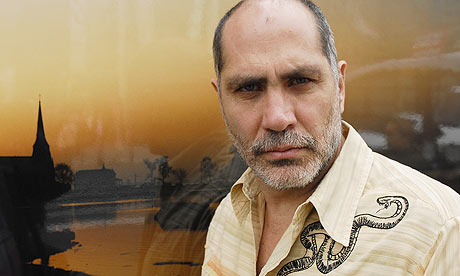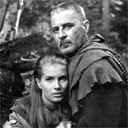Guillermo Arriaga is obsessed with death. In all the films he has written - Amores Perros, 21 Grams, Babel, The Three Burials of Melquiades Estrada - characters have been forced to confront their mortality. So it's no surprise that the Mexican screen-writer's directorial debut, The Burning Plain (released here next month), deals with a woman who is clearly repressing memories of a serious trauma in her past.
"My identity is constructed by the people I love - by the people around me," says Arriaga. "Each time one of them dies, part of my identity is broken and lost. I am obsessed with how that loss affects my own identity. We live in a society obsessed with repressing death. I think it is the job of a writer to deal with the important things of life - among them death."
Dip into Arriaga's life story and you soon understand where all this comes from. When he was 10 years old and playing baseball on the streets of Mexico City, a 26-year-old man beat him close to death. "My brother, who was nine, stepped in a puddle and splashed a girl. The girl's brother slapped me in the face. Then he grabbed the baseball bat and started hitting me. He battered me badly. I remember the last blow was here, on the neck." Arriaga leans forward to show the nape of his neck.
Several years later, Arriaga was involved in another, equally traumatic incident. He was sleeping in the back of his truck as he was being driven through the mountains. The driver started fooling around and lost control of the vehicle. "We fell down a cliff. I woke up in the middle of the accident. We were in freefall for about 10 metres and then we began rolling. I remember waking up and saying, 'We're going to die.' I tried to clutch myself in a ball. I survived the first roll, the second, the third - and after the fourth roll, the car stopped. I lost my nose ... all these bones were lost," he says, pointing between his eyes. "This is a reconstruction."
A few moments later, Arriaga also confides that he has a heart condition. It's nothing too serious as long as he looks after himself. However, when he was in his early 20s, he was boxing and his heart became swollen. Again, he came close to death.
It was at this point that he began writing in earnest. His role models were William Faulkner and Thomas Wolfe. When you hear such anecdotes, you begin to understand that all those convulsive moments in his work aren't just make-believe but are rooted in what he has experienced.
The Burning Plain is the story of an Oregon restaurant manager (played by Charlize Theron) who is successful but emotionally distant, afraid to let anyone know what she is feeling. In time-honoured Arriaga fashion, her story is interwoven with that of an all-American mom (Kim Basinger) who has been having an affair with a married Mexican man, crossing race and class boundaries.
The film is pitched somewhere between family melodrama and Greek tragedy. At first, the links between characters are opaque, but as the film progresses, old wounds are reopened and we slowly begin to understand the behaviour of the characters. It's hard to say much more about the movie without giving away the plot - something the publicists are begging journalists not to do.
Ask the writer-director about the origins of the film and, surprisingly, he traces it back to his lifelong obsession with hunting. "I've been hunting with a slingshot since I was a kid. In the small Mexican villages, all the kids have slingshots. I was amazed - I was once hunting doves with a shotgun and the kid with the slingshot killed more than me.
"Hunting has always been in my work. Anyone who has seen my films knows that the characters behave like hunters. In 21 Grams, there is Sean Penn hunting the Naomi Watts character, and then Naomi Watts hunting Benicio Del Toro. In Amores Perros, Babel and Three Burials, there is always someone hunting in a metaphorical way."
Although he elicits Basinger's best performance since LA Confidential, Arriaga admits he was initially apprehensive about casting the Hollywood star (who was suggested to him by Theron). "In her previous roles, she has this kind of sex aura and charisma. She is a very sexy woman. But when I met her, I saw that her previous movies had nothing to do with the real person. The real person has much more to offer than the icon that I knew through cinema. After I met her, I realised she would be good for the character - she would be able to bring fragility and not only sexiness."
Arriaga takes his profession very seriously, and is absolutely not a writer for hire. "In this world, you are bought as you sell yourself," he says. "If you portray yourself as someone who wants badly to be hired for work, they will treat you that way. But I have been very clear that I only write my own material. I don't develop ideas from other people. Even when I have been tempted to adapt incredible books or work with incredible people, I have said no."
He is the author of three novels, but doesn't differentiate between working on novels and screenplays; he treats each with the same respect, and bristles at the idea that a screenwriter is simply there to provide a blueprint from which the director and crew can make their movies. "I try to bring literary structure to cinema. I always wanted to do a film with a structure like The Sound and the Fury."
When at work on a new project, Arriaga says he writes the whole night through, from 10pm to 5am, and won't deviate from this routine until the script, story or novel is complete.
Arriaga is not forgiving to those who cross him. Ask him about Alejandro González Iñárritu - his erstwhile collaborator, who directed Amores Perros, 21 Grams and Babel - and he says coldly that Iñárritu broke the "gentleman's agreement" they used to have. "There is no relationship now. Yeah, that is very sad. We have different points of view about our work." Part of the agreement was that he and Iñárritu would share credit. "That wasn't fulfilled," says Arriaga, clearly still smarting over the way Iñárritu took so many of the plaudits for their movies together. He says he respects Iñárritu's work. "Creatively, Alejandro and I are completely in synch. He has been very respectful of the material. That is not the problem with Alejandro. There are different problems."
The film-maker is a contradictory character. On the one hand, he is a bit of a jock - a tall, well-built man who once harboured dreams of being a professional footballer. "I went to these trials and I was accepted because of my height," he says. "But between my brain and my feet, there is no connection. I wasn't very good. I was the kind of very rude defender who can break the leg of a forward." On the other hand, he portrays himself as a shy figure who used to read because he was too bashful to speak to girls, and who is steeped in the works of Shakespeare, Sophocles and Schiller, as well as what he calls "all of the tragics".
Arriaga's work for the screen divides opinion. His screenplays are complex, with no concessions to linear narrative. Storylines flit back and forth in time, and are told from many different perspectives. Some people are bowled over by his talent: "Guillermo has pretty much invented a new way of telling motion picture stories," says Walter Parkes, one of the producers of The Burning Plain. Others find his style portentous and contrived.
Such criticism hits Arriaga hard. "A bad review can kill you," he says, reflecting on the three years he spent writing and directing The Burning Plain. "You work so hard, and suddenly this guy writes something that destroys you. A good critic is somebody who shows you something you don't know about. A bad critic is somebody who tries to read your work through his own expectations."
But he is keen to direct again. Offers are flooding in, but he is determined to work only on his own material. Given that he spends at least two years writing a screenplay, his next movie won't be completed any time soon. However, Arriaga is not short on inspiration, at least. "They say that a writer has a gallon of ink and then runs out of ideas. Right now, I still have plenty of ideas."
• The Burning Plain is released on 13 March







